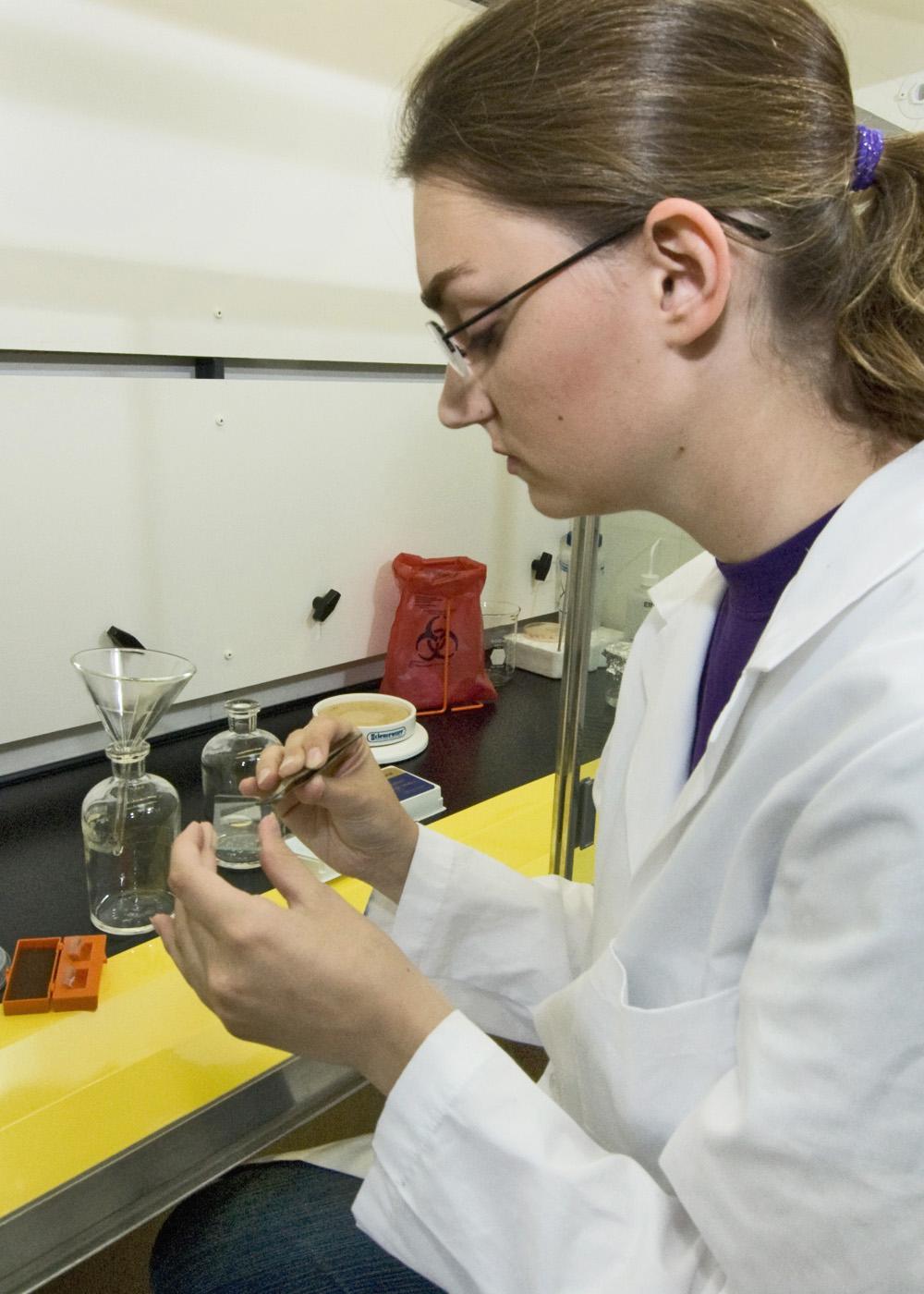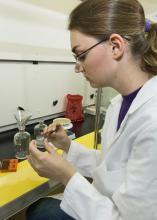Information Possibly Outdated
The information presented on this page was originally released on February 19, 2009. It may not be outdated, but please search our site for more current information. If you plan to quote or reference this information in a publication, please check with the Extension specialist or author before proceeding.
TNT breakdown presents dynamic study for Knott
By Patti Drapala
MSU Ag Communications
MISSISSIPPI STATE – While scientists are unsure about TNT's long-term effect on the environment as it breaks down, Mississippi State University student Erika Knott discovered a dynamic way to practice the art of forensics through a research project on its degradation.
Knott, a junior from Monroe, La., wants to be a forensic scientist for the FBI. She is majoring in biochemistry, which is teaching her to identify and isolate unknown chemical and biological samples. By using molecular-based techniques, forensic scientists also can identify individuals and perhaps solve criminal cases.
“Students pursuing scientific fields need opportunities to broaden their knowledge bases and sharpen their analytical skills to develop into the professionals of tomorrow,” she said.
Knott searched for opportunities to enhance her education and the possibility of future employment or graduate school admission. She had heard about the undergraduate research opportunities offered through the Shackouls Honors College.
MSU alumnus Bobby Shackouls and his wife, Judy, donated $10 million to establish an honors community for undergraduate research and academic excellence. Knott applied for a fellowship and was overjoyed when she received one. She used the award to participate in a comparative study of TNT degradation products conducted at a toxicology laboratory in Monroe last summer at the University of Louisiana.
“We encourage our students to participate in internships and undergraduate research experiences,” said Scott Willard, head of the MSU Department of Biochemistry and Molecular Biology. “These experiences help students stand apart from their peers when applying for jobs and pursuing career goals.”
The university study was funded through the U.S. Department of Defense and the U.S. Army Corps of Engineers.
“This opportunity allowed me to gain considerable experience in a laboratory and also learn the basic investigative techniques forensic scientists use to ascertain what happened,” Knott said. “Science is continually discovering how substances in the environment can affect living organisms, and that knowledge can help us remove a harmful substance or unravel a mystery.”
There is no mystery as to the nature of TNT, or 2, 4, 6-trinitrotoluene. TNT is a yellow, odorless industrial compound classified as a secondary explosive. This hazardous material literally can move mountains, but it also can contaminate groundwater and soil. At high doses and levels of exposure, TNT can cause serious health problems, such as anemia, liver dysfunction, skin irritation and eye cataracts.
Microbes in the soil break down TNT into substances referred to as degradation products. Little is known about the toxicity of these products, said project supervisor Sharon Meyer of the Toxicology Department at the University of Louisiana's College of Pharmacy.
Meyer wanted Knott to have a good educational experience while working on the project. She assigned Knott to take samples of liver, kidney and spleen tissue and blood that had been exposed to TNT. Knott prepared the samples for analysis under the microscope.
“In taking a tissue sample, my first step was to preserve the extracted organ in paraffin,” Knott said. “Then, I precisely cut slivers of tissue at small, specialized intervals on the organs for mounting onto glass slides.”
Knott also mastered a staining technique that enhances visibility of cell content.
“Through her work at our laboratory, Erika helped our researchers show that TNT degradation products appear to be less hazardous to the environment than TNT itself,” Meyer said.
Knott is back at MSU enjoying her college experience. She is keeping her fingers crossed that the FBI will accept her application for an internship. That experience, as she indicated, would be a blast.
Contact: Dr. Scott Willard, (662) 325-2640



